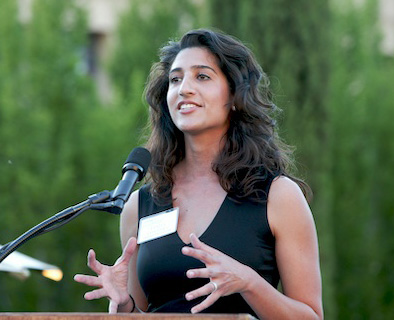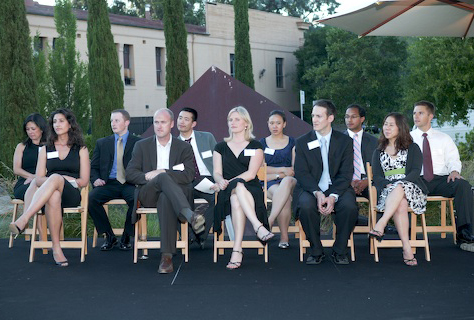Biodesign Innovation Fellowship Graduation Address, 2008
given June 10, 2008 by Venita Chandra, representing the 2008 graduating fellows
 Good
evening! I am honored to speak to you all today on behalf of the
graduating class. We, Biodesign fellows, and likely many
of you in the extended community, feel privileged to be involved in this
special field. Medical technologies, have and will continue to,
fundamentally transform the health care landscape as we know it today. We
are really fortunate to be at the leading edge of a remarkable period
of medical progress. In the words of neurologist Oliver Sacks,
medicine is being asked to "transcend the possible," and that
is exactly what we in this field and in the Biodesign program are trying
to do.
Good
evening! I am honored to speak to you all today on behalf of the
graduating class. We, Biodesign fellows, and likely many
of you in the extended community, feel privileged to be involved in this
special field. Medical technologies, have and will continue to,
fundamentally transform the health care landscape as we know it today. We
are really fortunate to be at the leading edge of a remarkable period
of medical progress. In the words of neurologist Oliver Sacks,
medicine is being asked to "transcend the possible," and that
is exactly what we in this field and in the Biodesign program are trying
to do.
The Biodesign fellowship is one of the most unique and forward-thinking post-graduate training programs, arguably, in the world. It has been an incredible learning experience for my fellow graduates and myself, for a number of reasons, and I would like to highlight a few of these with you tonight.
One of the core elements of the program is the formation of interdisciplinary teams. Bruce Coslet, coach of the Cincinnati Bengals, has said “The era of the rugged individual is giving way to the era of the team player." The Biodesign program has truly embraced this concept. We were asked, as doctors, engineers and business people, to jump in and work together, And in those multidisciplinary teams, we were given the opportunity to look firsthand for unmet clinical needs and learn how to fill those voids with innovative solutions. This team-oriented focus has been an aspect which we fellows have found at times challenging, as we learn to work with each and speak each other’s languages, but ultimately incredibly beneficial!
Together, we learned how intricate the process of developing a medical technology is, not only because it involved significant teamwork, and time and money, but also because it required each of us to share from our own discipline, and to gain from other disciplines, an in-depth understanding of, what we came to learn to be, the many components that go into actually translating medical technologies from ideas into patient care
Another key element of the Biodesign program is its emphasis on innovative thinking. This was touched on by alumni Dr. Carlos Mehry, in his address at last years Biodesign graduation, when he mentioned that this program changes our entire way of thinking. I could not agree more! To be innovative, we are asked to do some dreaming and imagining, to trust not-yet-well-developed ideas, to think in metaphors, and to find unlikely connections. This kind of thinking may be dramatically different from what many of us were used to. I, for example, have come a long way from the nose-to-the-grindstone, task-oriented surgical resident I was 2 years ago, before starting the fellowship. In those days, I was focused on getting the job done, I longed for efficiency, and would PULL OUT MY HAIR when doing time wasting activities. Now, I have a totally different outlook when doing even the most mundane things. Driving, or waiting in the airport security lines are now, no longer merely a waste of my time instead I take the opportunity to daydream, think of new ideas and entertain flashes of insight....a big change for me!
 The ultimate goal of the Biodesign Program, is a simple one: to create
the next generation of leaders in the field of medical device innovation. It’s
evident, that the actual execution of such a goal, is not so simple,
and while the measurement of success is challenging, I would argue, that
the Biodesign program has been particularly successful in providing the
ingredients necessary for reaching this goal.
The ultimate goal of the Biodesign Program, is a simple one: to create
the next generation of leaders in the field of medical device innovation. It’s
evident, that the actual execution of such a goal, is not so simple,
and while the measurement of success is challenging, I would argue, that
the Biodesign program has been particularly successful in providing the
ingredients necessary for reaching this goal.
I am reminded of something I once heard from Alan Greenspan, who has said that, looking across all the different industries that he has been exposed to, he has seen 2 features that all great leaders have in common: 1) perspective and 2) an understanding of interdependencies. I believe that this summarizes quite nicely the experience that we gain from the Biodesign program. I’ve already described how our exposure to multiple disciplines has given us a broader, grander perspective of the whole picture of medical technology development. By actually going through the process of innovation, development and analysis, we have begun to get a first-hand appreciation of some of the interdependencies that exist in the environment we are working in. We also know that generating new knowledge, technology, and applications will continue to require more effective collaboration across boundaries, exactly like the Biodesign program has already jumpstarted.
It is important to keep in mind, that this process of gaining perspective and an understanding of interdependencies, is a really a lifetime goal. I would like to end by encouraging all of us to continually search for new ways to expand our knowledge beyond our current focus, to push across disciplines, technologies, countries, and economic boundaries. In this way we can continue to transcend the possible in medicine, and bring new and innovative solutions to patients of all kinds, and in all parts of the world….which is, ultimately, the goal of all of our efforts.
To conclude, on behalf of the entire graduating class I would like to
thank, the staff of Biodesign for their tireless commitment
to running the program from day to day....which is no small task! We
would like to thank Dr. Yock and Dr. Makower for having the vision to
believe that innovation can be taught, and for being our inspiring teachers. We
would like to thank all of the Biodesign faculty including Dr. Wang,
Dr. Gertner and in particular Dr. Todd Brinton for being our mentors
and advocates through this process. We would like to thank
Dr. Krummel for his undying enthusiasm and commitment to this program
and to all of us as individuals. And finally we would like to extend
a heartfelt thanks to all of you in the extended Biodesign community
for creating a rich and innovative environment, and for your generosity
and support of all of us fellows, as we integrate within it.
Thank you very much.



